 |
Convert MPEG to Xvid
|
MPEG to Xvid Converter Software converts MPEG files to Xvid
fast. Xvid offers outstanding quality and performance clearly surpassing expensive,
competing products. Xvid allows you to create video for interoperable exchange
with portable or home multimedia devices as Xvid is widely supported in hardware.
Being open-source, Xvid is future-proof and secure to use.
Besides MPEG and Xvid, the converter also supports common and uncommon video
and audio formats and protable devices such as AVI, SWF, WMV, M4A (MPEG-4 audio), 3G2, WAV, MKA, etc. It could convert
DIVX to FLV, 3G2 to Android Tablet, XVID to WMV, M2TS to MPA, DVD to WAV, and so on.
MPEG to Xvid Converter Software supports batch conversion and, is
full compatible with 32-bit and 64-bit editions of Windows 10/8/7/Vista/XP/2000.

What is MPEG?
Popular video format standardized by the Moving Picture Experts Group (MPEG);
compressed using MPEG-1 or MPEG-2 compression; often used for creating
movies that are distributed over the Internet. MPEG-2 is widely used as
the format of digital television signals that are broadcast by terrestrial
(over-the-air), cable, and direct broadcast satellite TV systems. It also
specifies the format of movies and other programs that are distributed
on DVD and similar discs. TV stations, TV receivers, DVD players, and other
equipment are often designed to this standard. MPEG algorithms compress
data to form small bits that can be easily transmitted and then decompressed.
MPEG-2/Video is formally known as ISO/IEC 13818-2 and as ITU-T Rec. H.262.
MPEG-2 is a standard for "the generic coding of moving pictures and
associated audio information". It describes a combination of lossy
video compression and lossy audio data compression methods which permit
storage and transmission of movies using currently available storage media
and transmission bandwidth. MPEG-1 (1993): Coding of moving pictures and
associated audio for digital storage media at up to about 1.5 Mbit/s (ISO/IEC
11172). The first MPEG compression standard for audio and video. It is
commonly limited to about 1.5 Mbit/s although the specification is capable
of much higher bit rates. It was basically designed to allow moving pictures
and sound to be encoded into the bitrate of a Compact Disc. It is used
on Video CD and can be used for low-quality video on DVD Video. It was
used in digital satellite/cable TV services before MPEG-2 became widespread.
To meet the low bit requirement, MPEG-1 downsamples the images, as well
as uses picture rates of only 24-30 Hz, resulting in a moderate quality.
It includes the popular MPEG-1 Audio Layer III (MP3) audio compression
format.
What is Xvid?
XviD is the name of a popular new video codec being developed as an open
source project by volunteer programmers from all over the world. XviD codec
is intended for compressing video data in order to facilitate and speed
up online video data exchange and improve storage on hard disks. With usual,
so-called proprietary software where source code is not available to the
public, users are stuck in case the creating company goes bankrupt or discontinues
the product. Xvid uses ASP features such as b-frames, global and quarter
pixel motion compensation, lumi masking, trellis quantization, and H.263,
MPEG and custom quantization matrices. The Xvid developers decided to stop
work and go public to force Sigma Designs to respect the terms of the GPL.
In early 2001, DARC member Sparky wrote an improved version of the encoding
core called encore2. This was updated several times before, in April, it
was removed from CVS without warning. The explanation given by Sparky was
"We (our bosses) decided that we are not ready to have it in public
yet." While you can obtain Xvid free of charge, the quality of the
codec is outstanding and surpasses that of competing, expensive products.
The Xvid encoder has won several awards and has been found in independent
tests to provide superior picture quality and more efficient video compression
than any other comparable video codec. Due to its speed, high-definition
video compressed with Xvid can be easily played back on today's PCs or
PAL video from e.g. a TV card can be captured in real-time using the Xvid
codec. A major strength of Xvid is the premium picture quality it delivers,
especially for offline, multi-pass compression. Therefore, the Xvid codec
is ideal for archiving home video on DVD or CD. Consequently, many digital
cameras or DVD players come bundled with the Xvid codec today.
How to Convert MPEG to Xvid?
- Free Download MPEG to Xvid Conversion
Software
- Install the Program by Step-by-step Instructions
- Launch MPEG to Xvid Converter Software
- Choose MPEG Files
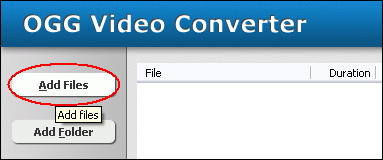
Click "Add Files" to choose MPEG files.
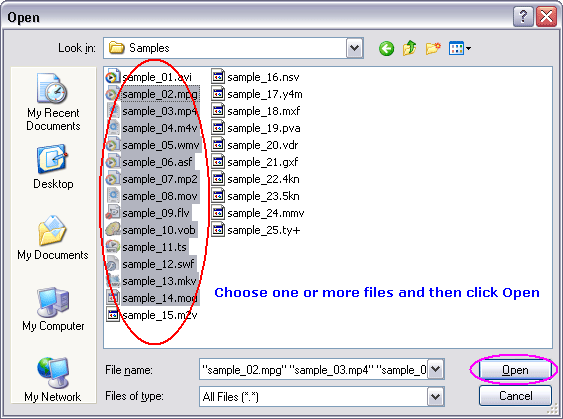
Choose one or more MPEG files you want to convert and then click Open.
MPEG to Xvid Converter Software will open MPEG files and get file
information of the file such as width, height, frame rate, video bit rate, audio
sample rate, audio bit rate, audio channels, and then display the information
of MPEG file at conversion list.
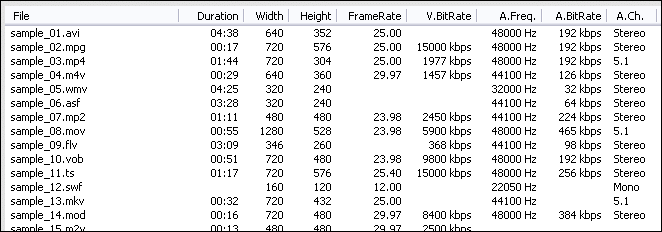
- Choose Output Format
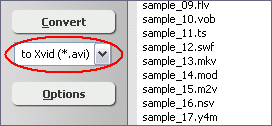
Click on combo box of output format and then choose "to Xvid".
- [Optional, for advanced user]
Set Xvid Encoding Parameters
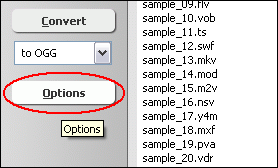
If you want to change Xvid encoding parameters such as bit rate, frame rate, video
size, and aspect ratio, please click "Options".
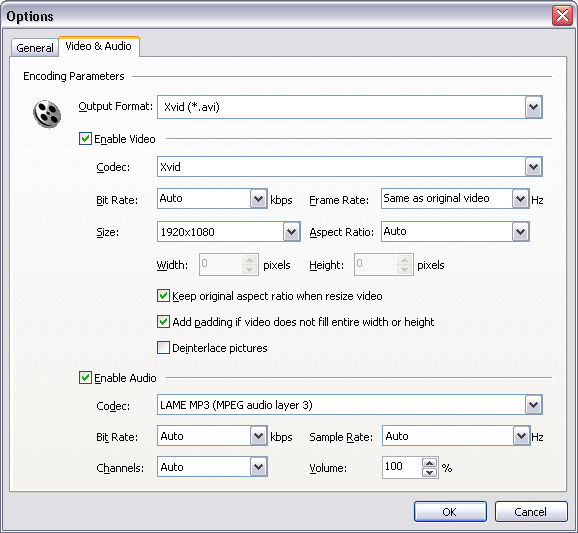
And then, switch to tab "Video & Audio" and choose "Xvid
(*.avi)" at "Output Format", and then set options for
video and audio.
- Convert MPEG to Xvid
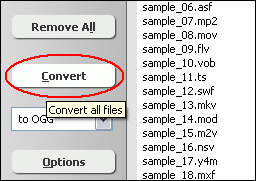
Click "Convert" to convert all MPEG files in list to Xvid format.

The software is converting MPEG files to Xvid.
- Play and Browse Xvid File
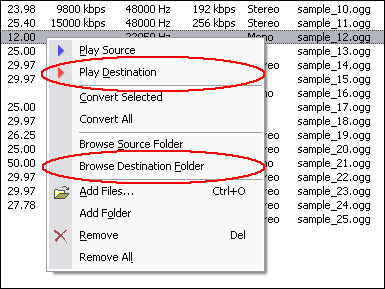
When conversion completes, you can right-click converted item and choose "Play
Destination" to play the outputted Xvid file; or choose "Browse
Destination Folder" to open Windows Explorer to browse the outputted Xvid
file.
- Done
Top
MPEG to Xvid Converter Software is 100% clean and safe to
install. It's certified by major download sites.

Convert MPEG to Xvid Related Topics:
|











